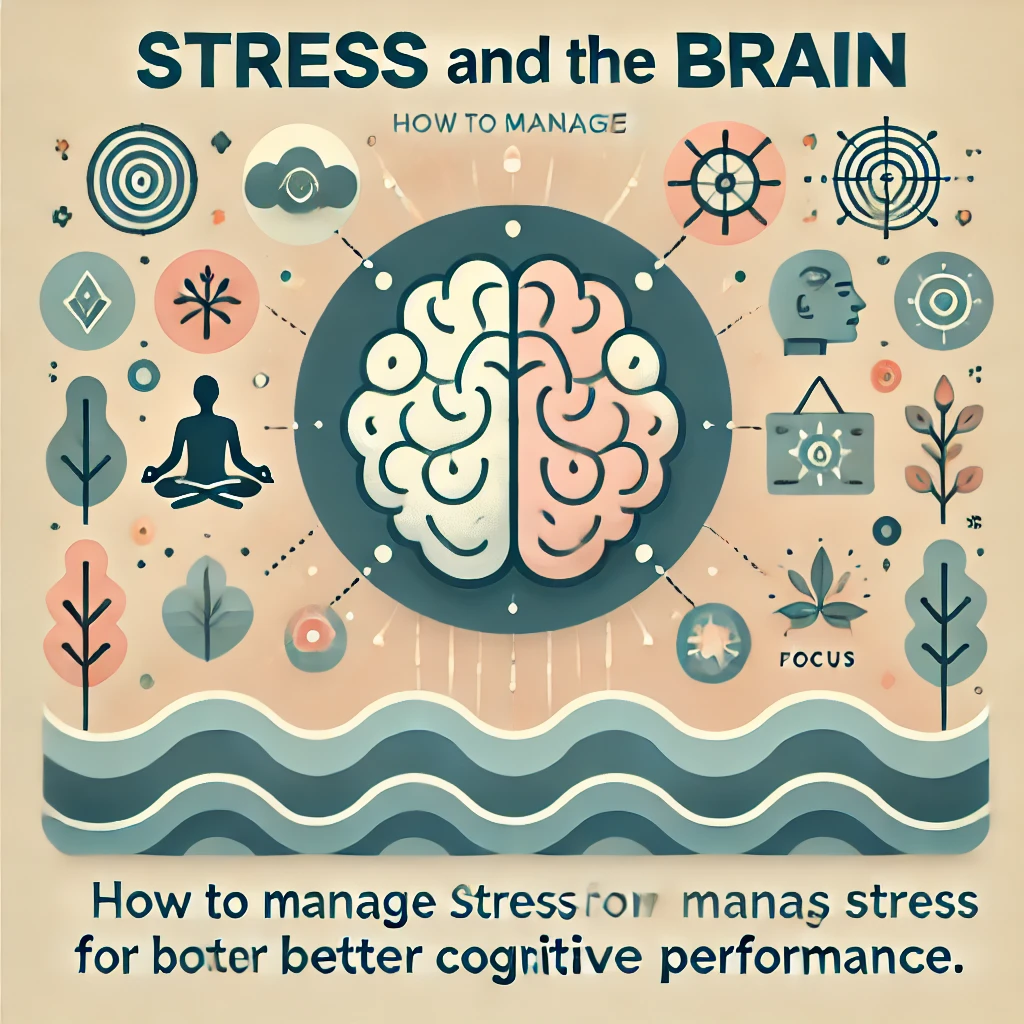Introduction
Stress is something most of us deal with daily, whether from work, relationships, or just trying to juggle life’s endless tasks. But did you know that stress doesn’t just impact our mood or physical health? It also has a significant impact on brain function and cognitive performance. In small doses, stress can help us stay alert and focused. However, chronic stress takes a toll on our mental clarity, memory, and overall cognitive abilities.
In this article, we’ll delve into the effects of stress on brain function, explore how stress impacts cognitive performance, and discuss actionable ways to manage stress for better focus and mental clarity. By understanding the connection between stress and mental performance, you can take steps to protect your brain health and improve cognitive wellness.
1. Understanding How Stress Impacts Brain Function
When we encounter stress, our brain releases hormones like cortisol and adrenaline, which prepare us for “fight or flight” mode. While this response is helpful in short bursts, chronic stress leads to prolonged cortisol exposure, which can harm the brain over time.
Effects of stress on brain function:
- Memory impairment: High levels of cortisol can affect the hippocampus, the brain’s memory center, making it harder to form and recall memories.
- Reduced cognitive flexibility: Chronic stress limits our ability to adapt and problem-solve, which can make us feel “stuck” in difficult situations.
- Lowered mental clarity: Stress impacts focus and attention, making it challenging to stay present and productive.
Relatable anecdote:
During a particularly stressful period at work, I found myself struggling to remember even simple details and missing deadlines. It was as if my brain was on “overload,” and I couldn’t keep up. This was my wake-up call to explore stress management techniques for better brain health.
2. How Stress Impacts Cognitive Performance
Stress doesn’t just affect our emotions; it directly influences cognitive performance, reducing our mental agility, focus, and ability to think clearly. This is because stress limits blood flow to the prefrontal cortex, the part of the brain responsible for decision-making, attention, and impulse control.
Key ways stress affects cognitive performance:
- Impairs decision-making: With high stress, we tend to make impulsive or poor decisions, as our brain prioritizes immediate survival over long-term thinking.
- Reduces focus and attention: Chronic stress impacts attention span, making it hard to concentrate on tasks for extended periods.
- Decreases problem-solving skills: When under stress, the brain struggles to consider multiple perspectives, which affects creative and flexible thinking.
Example:
One of my friends, who works as a teacher, often talks about how she finds it harder to manage her classroom effectively when she’s stressed. She feels less patient and more reactive, affecting her ability to solve problems creatively in her interactions with students.
3. How to Manage Stress for Better Brain Health
While we can’t eliminate all sources of stress, we can control how we respond to them. Developing a stress management routine helps protect brain health, allowing us to reduce the impact of stress on memory and cognition. Here are some brain health and stress reduction tips to incorporate into your daily life.
a) Prioritize Sleep
Sleep is essential for brain function, and lack of sleep can worsen the effects of stress on the brain. During sleep, the brain processes information, clears out toxins, and repairs itself. When you’re sleep-deprived, your brain becomes more vulnerable to stress and less able to focus.
How to improve sleep for stress management:
- Set a regular sleep schedule: Going to bed and waking up at the same time each day helps regulate your body’s internal clock.
- Limit screen time before bed: Blue light from screens can interfere with sleep quality, so try to avoid screens at least an hour before bed.
- Create a relaxing bedtime routine: Incorporate calming activities like reading or taking a warm bath to signal to your brain that it’s time to wind down.
Relatable anecdote:
After weeks of poor sleep, I started prioritizing a set bedtime and avoided screens before bed. Not only did my sleep improve, but I also noticed I was much calmer and better equipped to handle daily stress.
b) Incorporate Physical Activity
Exercise is one of the most effective ways to manage stress for brain health. Physical activity releases endorphins, which are natural mood boosters, and reduces levels of cortisol. Additionally, exercise increases blood flow to the brain, improving focus and cognitive performance.
Ways to incorporate exercise for better focus:
- Aim for at least 30 minutes a day: You don’t need a gym; simple activities like walking, yoga, or even dancing can be highly beneficial.
- Find an activity you enjoy: When you enjoy the exercise, it’s easier to stick with it and get the full stress-relief benefits.
- Use exercise as a break: Taking a short walk or doing stretches between work tasks can reduce stress and improve focus.
Example:
A colleague of mine started doing a quick yoga routine during her lunch breaks. She found it reduced her afternoon stress levels and made her feel more energized and focused for the rest of the day.
4. Practice Mindfulness and Meditation for Mental Clarity
Mindfulness and meditation are powerful techniques to manage stress and improve cognitive performance. Practicing mindfulness encourages your brain to focus on the present moment, reducing feelings of stress and anxiety.
Benefits of mindfulness for stress reduction:
- Lowers cortisol levels: Regular mindfulness practice reduces cortisol, helping you feel more relaxed and clear-headed.
- Improves attention span: Meditation strengthens the brain’s ability to focus on a single task, which can improve mental clarity.
- Enhances emotional resilience: Mindfulness teaches you to respond to stress calmly, helping to reduce its impact on brain health.
How to start a mindfulness practice:
- Start with short sessions, even just five minutes a day, focusing on your breathing or a simple phrase.
- Use mindfulness apps like Headspace or Calm if you’re new to meditation.
- Practice mindful breathing during stressful moments to help ground yourself.
Relatable anecdote:
I used to get stressed out by small things, like running late or dealing with a difficult email. After practicing mindfulness, I found I could approach these situations with a calmer mindset, which helped reduce my overall stress levels.
5. Use Deep Breathing Techniques to Reduce Stress
Deep breathing activates the body’s relaxation response, helping lower heart rate and reduce cortisol levels. Simple breathing exercises can be a quick and effective way to manage stress, especially when you need immediate relief.
Techniques to manage stress for mental clarity through breathing:
- 4-7-8 breathing: Inhale for four counts, hold for seven, and exhale for eight. This technique calms the nervous system and reduces anxiety.
- Box breathing: Inhale for four counts, hold for four, exhale for four, and hold again for four. Repeat several times to reset your focus.
- Diaphragmatic breathing: Focus on breathing from your diaphragm (belly), which can reduce tension and promote relaxation.
Example:
Whenever I feel overwhelmed by a task at work, I pause and take a few deep breaths using the 4-7-8 technique. Within minutes, I feel more centered and able to tackle the task without feeling as stressed.
6. Stay Socially Connected
Social connections provide emotional support, reducing the effects of stress on mental performance. Spending time with friends or family helps us feel grounded and provides a healthy distraction from stressors. Even brief social interactions can boost mood and improve cognitive performance.
How social interactions reduce stress and improve cognition:
- Provides emotional support: Talking through stress with someone can help put things in perspective and reduce anxiety.
- Stimulates the brain: Social interactions challenge cognitive skills, such as memory and verbal communication, which benefit mental agility.
- Releases oxytocin: Spending time with loved ones releases oxytocin, known as the “love hormone,” which counteracts stress.
Relatable anecdote:
I find that when I’m stressed, a quick chat with a friend lifts my spirits and helps me refocus. Socializing gives me a break from overthinking, which allows my mind to reset.
Tips for staying connected:
- Make time each week for social activities, even if it’s just a coffee chat with a friend.
- If in-person interaction isn’t possible, try virtual calls to maintain connections.
- Engage in group activities, like a hobby or class, to meet new people and keep the brain engaged.
7. Practice Time Management to Reduce Overwhelm
Poor time management can create unnecessary stress, leading to mental fatigue and reduced cognitive performance. Breaking tasks down and setting realistic deadlines can help make stress more manageable.
Ways to manage time for stress reduction:
- Prioritize tasks: Focus on completing high-priority tasks first to reduce feelings of overwhelm.
- Use time-blocking: Dedicate specific times to specific tasks to reduce decision fatigue and improve focus.
- Take regular breaks: Short breaks between tasks can reduce stress and refresh your mind, boosting productivity.
Example:
I used to feel overwhelmed by my to-do list until I started organizing tasks using time blocks. Focusing on one task at a time made my workday less stressful and improved my productivity.
8. Nourish Your Brain with a Balanced Diet
The food you eat directly impacts brain function and stress levels. A diet rich in nutrients supports cognitive performance, while a diet high in sugar and processed foods can increase stress and fatigue.
Brain-boosting foods to include:
- Omega-3 fatty acids: Found in fish, flaxseeds, and walnuts, these help improve cognitive performance.
- Antioxidants: Berries, dark chocolate, and leafy greens reduce inflammation and support brain health.
- Magnesium: Found in nuts, seeds, and whole grains, magnesium helps reduce stress and promotes relaxation.
Relatable anecdote:
I used to rely on coffee and sugary snacks to get through stressful workdays, but I’d always crash by mid-afternoon. Once I started incorporating brain-boosting foods like berries and nuts, I noticed I had more sustained energy and mental clarity.
Conclusion
Managing stress is essential for maintaining brain health and cognitive performance. From sleep and exercise to mindfulness and a balanced diet, there are multiple techniques to reduce stress and improve focus, memory, and mental clarity. By incorporating these strategies, you can create a stress management routine that protects your brain and helps you perform at your best.
Remember, while we can’t eliminate stress entirely, learning how to manage it effectively can make a world of difference in your mental well-being and cognitive health.
FAQ Section
1. How does stress affect brain health?
Chronic stress affects brain health by releasing cortisol, which impairs memory, focus, and cognitive flexibility over time.
2. Can managing stress improve cognitive performance?
Yes, stress management reduces cortisol levels, allowing for better focus, memory retention, and decision-making.
3. What are some quick ways to reduce stress at work?
Deep breathing exercises, a short walk, and taking mindful breaks are effective ways to quickly reduce stress and improve focus at work.
4. Does sleep help reduce stress?
Quality sleep helps the brain process and recover from stress, reducing cortisol levels and supporting mental clarity.
5. How does mindfulness help with stress?
Mindfulness reduces stress by promoting relaxation, improving focus, and enhancing emotional resilience.
6. What foods can help manage stress?
Foods rich in omega-3s, antioxidants, and magnesium, like fish, berries, and leafy greens, support brain health and reduce stress.
7. Can exercise really help with stress?
Yes, exercise releases endorphins and reduces cortisol, which improves mood, focus, and resilience to stress.
8. How does socializing reduce stress?
Socializing releases oxytocin, providing emotional support and reducing stress, which improves cognitive performance.
9. Why is time management important for stress?
Effective time management reduces overwhelm, making it easier to stay focused, reduce stress, and improve productivity.



